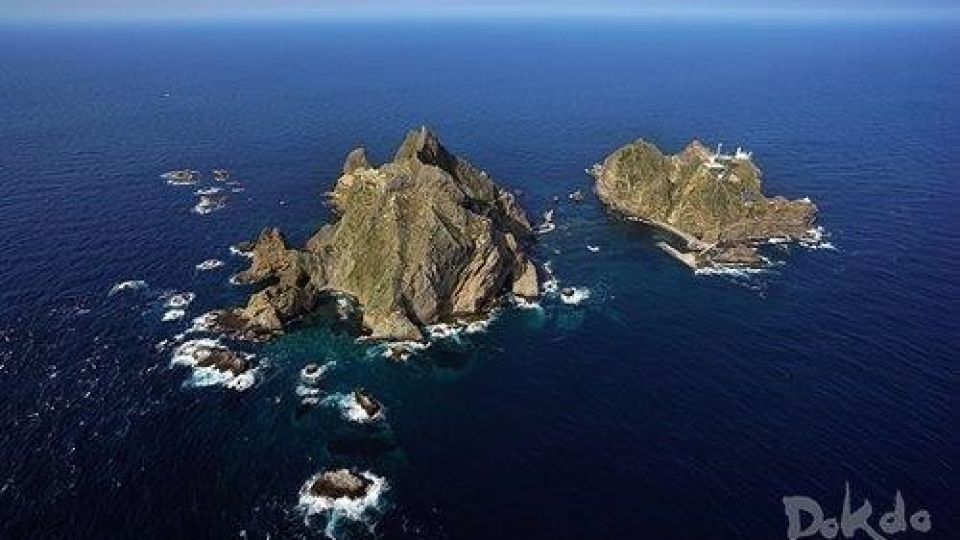June 1, 2022
SEOUL – Territorial dispute over the Dokdo islets has flared up once again, even as the governments of South Korea and Japan expressed their respective determination to reset their long-strained relationship.
The South Korean government rejected a protest from Japan on Tuesday after the neighboring country lodged a complaint against Seoul for conducting a marine survey in waters off the Dokdo islets.
“We cannot accept Japan’s claims on our legal activities which have been carried out in accordance with international laws, such as the UN Convention on the Law of the Sea and other related domestic laws,” South Korea’s Foreign Ministry spokesperson Choi Young-sam said Tuesday.
On Monday, Japanese Chief Cabinet Secretary Hirokazu Matsuno raised issue with South Korea, accusing a Korean research vessel that was operating a marine survey of intruding on its self-claimed Exclusive Economic Zone around the Dokdo islets.
Matsuno said the Korean research vessel carried out a survey without making a prior request with Japan and that the action was “totally unacceptable.” According to the chief secretary, the two governments discussed the incident, but both sides maintained their stance of sovereignty over the islets.
While South Korea currently holds control over the Dokdo islets and manages it as its own territory, Japan has claimed sovereignty over the islets, which it calls Takeshima, and has further asserted the sea surrounding the islets is within its Exclusive Economic Zone.
Following the complaint from Japan, the South Korean government rejected the protest, saying its research activity was legitimately carried out in accordance with related laws.
Japanese media reports that director-general level talks could be held over the issue in Seoul on or after Friday, when Japanese officials are expected to travel for a trilateral discussion that also includes the United States.
As the Japanese government has not lodged a complaint regarding Korea’s marine surveys in the past five years according to Japanese media outlets, Monday’s protest may be a political move to secure its standing in bilateral disputes with South Korea, experts here say.
While South Korea’s Foreign Ministry did not confirm details of their diplomatic exchanges over the matter, local media in Japan reported the Japanese government has not filed a complaint against Korea’s marine survey activities since May 2017.
Choi Eun-mi, a research fellow at the Asan Institute for Policy Studies, a Seoul-based think tank, said the Japanese government may be showing its intentions that it would not “back down” on some long-standing disputes with South Korea.
“Both governments have shown their desire to renew relations, but (the complaint) appears to show that the Japanese government does not plan to concede in some of the conflicting issues that remain between them, including the Dokdo territorial dispute,” Choi told The Korea Herald.
As South Korea and Japan welcomed new administrations in May and last October, respectively, the two governments have expressed the will to reinvigorate bilateral ties that have recently been at their weakest in decades.
Major sticking points between them include Japan forcing Koreans into labor and sexual slavery during the Japanese colonial period.
At the same time, they would not want the bilateral relations to affect their joint efforts to forge strong trilateral ties with the United States in handling the increasing nuclear threat posed by North Korea, Choi said.
The South Korean government will have to make extra efforts to persuade the public, as issues related to Japan are sensitive and taken seriously here, Choi added.
South Korea’s Foreign Ministry reiterated Tuesday that it will continue to cooperate with the US and Japan on the security front, and they all agree on a communication channel for their high-ranking officials to discuss security issues, including North Korea’s nuclear threats.
“South Korea, the US and Japan are the major countries in this region. So all three countries recognize and understand that they jointly hold the responsibility to maintain the security and prosperity of the region,” Foreign Ministry spokesperson Choi Young-sam said in a regular press briefing Tuesday.
“In this sense, South Korea, the US and Japan will continue to cooperate in the security sector in the means possible.”
The special envoys for North Korea from the US and Japan will be traveling to Seoul to hold bilateral and trilateral meetings with Kim Gunn, South Korea’s special representative for Korean Peninsula peace and security affairs, Friday.
They are expected to discuss joint countermeasures to address North Korea’s recent missile launches, which include an intercontinental ballistic missile in breach of a United Nations Security Council resolution, and also of the recalcitrant regime’s potential nuclear test.


